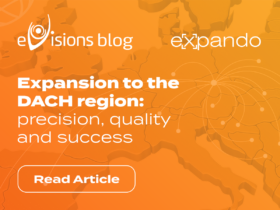SERP Conf. Vienna 2024: Key takeaways
11. 11. 2024 AutorLast week, we had the privilege of attending SERP Conf in Vienna, an event packed with cutting-edge insights into search engine optimization, AI advancements, and the latest in digital marketing trends.
Alongside SEO experts, marketers, and digital enthusiasts, we delved into sessions that not only highlighted the current SEO landscape but also explored the future trajectory of organic search. Key takeaways included shifts in Google’s algorithms, strategies for optimizing user intent, and best practices in leveraging AI tools. Here’s a recap of the highlights, standout presentations, and actionable tips we brought back for our team.

Web Accessibility: Optimizing for Inclusivity and SEO
Sara Fernández is an international SEO consultant from Spain and has a background in translation and localization. She shared with us the importance of accessibility online. The first thing that has to be understood when talking about accessibility is that:
“Disability can affect vision, hearing, mobility, mental health, neurodiversity and speech, and it can be classified as permanent, temporary or situational.” Meaning that at some point in our lives, we will all experience some form of disability.
For the ones that are still not convinced, the European Union will enforce a directive which is called European Accessibility Act (EAA) that aims to improve the functioning of the internal market for accessible products and services, by removing barriers created by divergent rules in Member States. It will be effective from 28.06.2025. It applied to businesses trading in the EU, regardless of location, it covers all digital products and services on the public sector websites as well as private sector online stores and platforms.
The objectives of the EAA are:
- Promote a more inclusive society
- Support independent living for individuals with physical, mental, intellectual, or sesory impairments
- Ensure accessibility for groups such as seniors, pregnant women, or those with temporary limitations
The requirements are:
- Adapt designs to accommodate temporary and situational disabilities
- Ensure compliance with standard that align with the Web Content Accessibility Guidelines (WCAG)
The conclusion for companies is that they should seek legal advice from their own or an external team before the regulation comes into force to counter the penalties for non-compliance.

Scaling Growth with AI-Generated Content
One particularly noteworthy presentation came from Murat Yatagan, who shared insights about his client, Blinkist. While Blinkist enjoyed strong brand recognition, their BOFU (bottom-of-funnel) traffic was notably limited. Despite holding the largest library of book summaries, crafted by humans and often enhanced with high-quality audio, there was still a significant challenge. What was the issue, and how could it be addressed?
Tackling the Challenge
Improving organic traffic for Blinkist required more than just an SEO-focused strategy; it involved enhancing the overall user experience and increasing engagement with the core product. However, as Murat pointed out, these efforts alone were insufficient. What was hindering further growth?
The answer lay in production costs. Each book summary cost approximately $750, creating a substantial barrier to scaling their content library. This manual approach was both costly and limiting. By implementing generative AI, they managed to cut the production cost of a book summary from $750 to just $5, enabling significant and efficient expansion.
Emphasizing Agility Over Perfection
As Murat said, “Speed is a habit you need to execute.”
To mitigate the risk of Google penalties, they employed carefully structured prompts for GPT, ensuring best practices were followed, such as incorporating book titles and author names to avoid duplication.
Key Guidelines Include:
- Value-Added Content: Ensure that templated landing pages offer meaningful and relevant information.
- Transparency in Scaled Content: Clearly disclose the use of AI-generated content within the material. Including an AI disclaimer underscores transparency and honesty about its use.
- Showcase the Content Production Process: Present a clear and streamlined approach to content creation.
- Continuous Feedback and Iteration: Regularly assess the effectiveness of AI-generated content and make necessary adjustments. Monitor engagement closely, comparing AI-generated summaries to those created manually to refine strategy as needed.
- Internal Linking: Ensure new content is integrated into the website structure. Without proper internal linking, content may remain unseen, so it’s essential not to overlook this step.
This comprehensive approach facilitated Blinkist’s ability to scale efficiently while maintaining high standards in content quality.
The Future of VR and AR in E-commerce
Speaker Garry White discussed the potential of VR goggles in transforming online shopping experiences. VR shopping aims to streamline the purchasing process for users. How does it achieve this? Simple—when users are uncertain about how a watch or other product will look on them, they may hesitate to buy. However, by allowing users to visualize the watch on their wrist through VR goggles, the decision becomes easier. The same principle applies to furniture: if shoppers can see how a new sofa will fit into their own space, they are more inclined to complete the purchase.

Further important takeaways:
Have you ever wondered what exactly is behind Helpful Content? Cyrus Shepard, founder of Zyppy SEO Consultant, has investigated this question. In his presentation “WTF is Helpful Content, Google” he showed us his findings.
He and his team looked at the big winners and losers of the Google updates and compared the content. Although the following results cannot be directly described as a ranking factor, clear trends can be identified:
- First-Person Pronouns / Page: The pages that used more first-person pronouns (I, I’m, my, we, etc.) were clearly winning.
- Fixed Scroll Ads: Pages that use fixed scroll ads that even cover the content of the page (mainly mobile) were losing.
- Non-Original Images: Google can understand very fast if the image is an original image or if it was used before. The pages that mainly use non-original images are losing.
Additionally there were a lot of recommendations for tools to improve the workflow. E.g. if you want to check the accessibility of your website, you can use various tools:
- Colorblindly: This Chrome extension allows you to view web pages with various vision impairments and thus detect insufficient contrast.
- WAVE Evaluation Tool: With this Chrome extension you can analyze individual pages, the tool gives you a detailed list of errors.
Among the recommended tools, Bastian Grimm mentioned:
- Make.com is a visual platform that enables users to design, build, and automate workflows without the need for coding – according to Bastian Grimm this is a MUST alongside custom GPT to make your work more efficient. – Someone in the audience even asked if this can be used to do context internal linking. The answer is yes, most of the CMS should be able to work with this automatization tool.

Thank you, SERP Conf.
Attending SERP Conf. Vienna 2024 provided invaluable insights into the evolving landscape of SEO, AI, and digital marketing. From Sara Fernández’s emphasis on web accessibility and the upcoming European Accessibility Act to Murat Yatagan’s case study on scaling content production through AI, the conference highlighted the pressing need for innovation and adaptability in digital strategies. Garry White’s discussion on the transformative potential of VR in e-commerce and Cyrus Shepard’s analysis of what constitutes “helpful content” offered practical takeaways for improving user engagement and organic visibility. Lastly, recommendations for efficiency tools, including Make.com for workflow automation, underscored the importance of leveraging the right resources to stay ahead. The actionable lessons learned at SERP Conf. will undoubtedly play a crucial role in shaping our approach as we continue to adapt to the dynamic world of digital marketing.







![Achieving 276% y-o-y Blog Traffic Growth with Topical Authority [Case Study]](https://www.evisions-advertising.com/yPVTOLUdUV/uploads//2024/08/e-blog__EN-1-280x210.png)


Komentáře